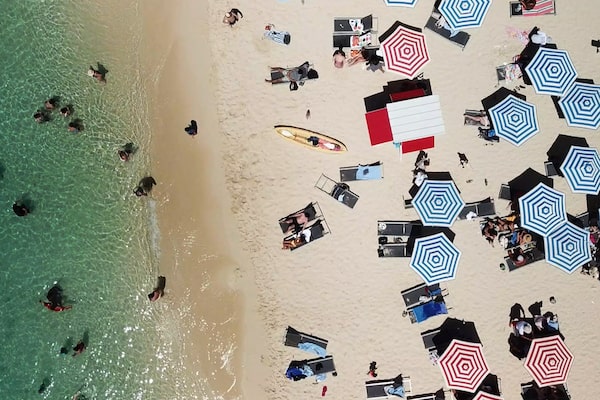
Documentary The Last Tourist takes a look at the damage caused by the surge in international tourism over recent decades.Courtesy of Elevation Pictures
Plan your screen time with the weekly What to Watch newsletter. Sign up today.
The Last Tourist
- Written and directed by Tyson Sadler
- Classification N/A; 100 minutes
- Opens April 1 in select theatres; available on-demand starting April 5
As countries waive COVID-19 entry tests and people dust off their passports, the timing couldn’t be better for The Last Tourist, a new documentary that takes a look at the damage caused by the surge in international tourism over recent decades.
When travel basically came to a standstill at the beginning of the pandemic, much ink was spilled about how the time away from jet-setting was an opportunity to reimagine how we explore the world. We’ll travel more sustainability, experts said. We’ll take longer, more nature-focused trips away from urban centres. We’ll learn from our mistakes!
And mistakes there are aplenty, as The Last Tourist explains, most of which stem from not connecting with the land and people we are visiting.
The big villain of the film is the cruise industry, which, with its megaships, keeps passengers as removed from local experiences as possible, surrounding them instead with Western comforts.
“It’s not travel any more. … Let’s just call it a transfer of environments,” says Bruce Poon Tip, founder of Canada’s G Adventures (and one of the documentary’s executive producers). All-inclusive vacations are second on the Most Wanted list. Like cruises, they aim to keep a guest’s money on-site, flowing up to foreign owners rather than out into the local community.
The Last Tourist does a decent job outlining all the ways these aspects of travel, along with many others, are terrible – but the viewer is left feeling like they’ve been sitting in a double-decker tour bus: You’re exposed to a lot, but it’s all surface level.
Where the doc gets interesting is when it takes an approach akin to slow travel, taking the time to fully immerse itself in an area. The segment on animal attractions is tragic: Even those aware that elephant rides should be avoided because of the cruel practices involved might be shocked to learn the animals sometimes try to kill themselves during “training.” These scenes should be mandatory viewing for anyone who still thinks these attractions are a fun idea.
But as awful as animal cruelty is, the look at “orphanage tourism” – which, yes, is a thing – was truly horrifying. And a fitting follow, since kids are being forced to perform like animals in what are essentially zoos of a different kind. Since 1995, the number of orphanages in Cambodia has increased 75 per cent, we learn, because there is money to be made from Westerners wanting to feel good about their vacations. Voluntourism – paying for the privilege of “teaching” kids or perhaps helping build a new schoolhouse as part of a trip – is too often simply a form of neo-colonialism, one expert says, and the emotional toll can be devastating for the children left in its wake.
The Last Tourist highlights other issues as well, but at times the journey feels a bit random, like a backpacker throwing darts at a map to decide where to go next. And it touches upon but never fully tackles a fundamental tension: Tourism can be terrible, but it can do a lot of good, lifting people out of poverty and providing much-needed funds for conservation initiatives. The film itself is a form of conflict: Beautiful to watch, it tells us why we shouldn’t travel while simultaneously inspiring wanderlust.
I expect most people inclined to watch The Last Tourist considers themselves “travellers,” not “tourists.” And therefore many of the ills of overtourism will not be news to them. As someone who puts herself into that category, I was hoping for more tangible solutions for how to travel better. And they do arrive, eventually.
But perhaps there is no greater take-away than words spoken by Judy Kepher-Gona, founder of the Kenya-based Sustainable Travel & Tourism Agenda (and, in my mind, the “star” of the documentary, owing to her blunt delivery of some hard truths).
“The places we call destinations are actually people’s homes,” she says.
If you wouldn’t do something in your own backyard, don’t do it in someone else’s.
Sign up for The Globe’s arts and lifestyle newsletters for more news, columns and advice in your inbox.